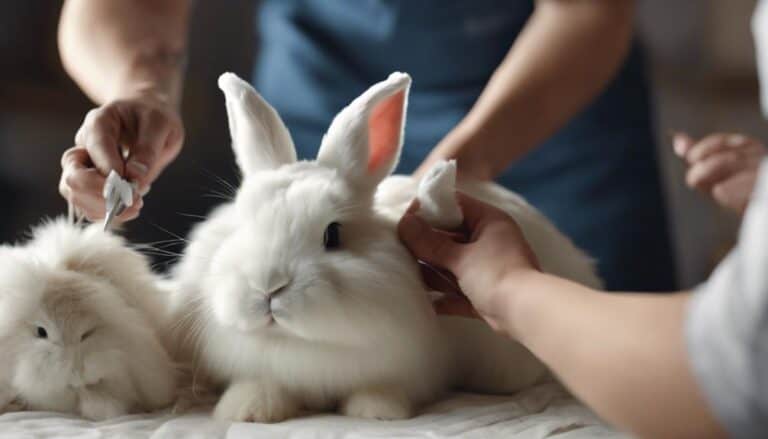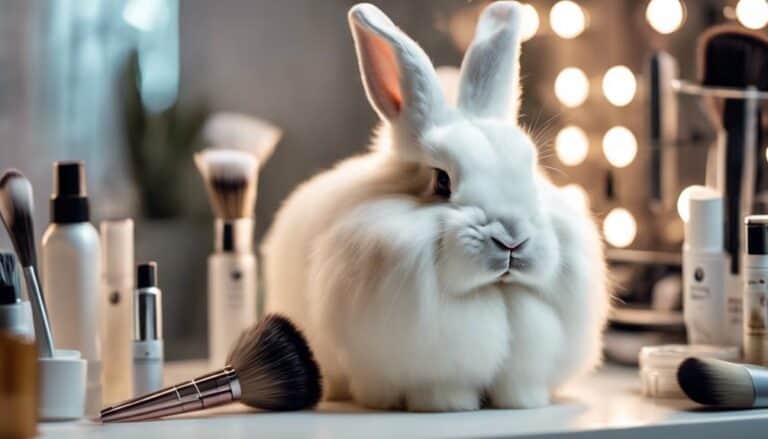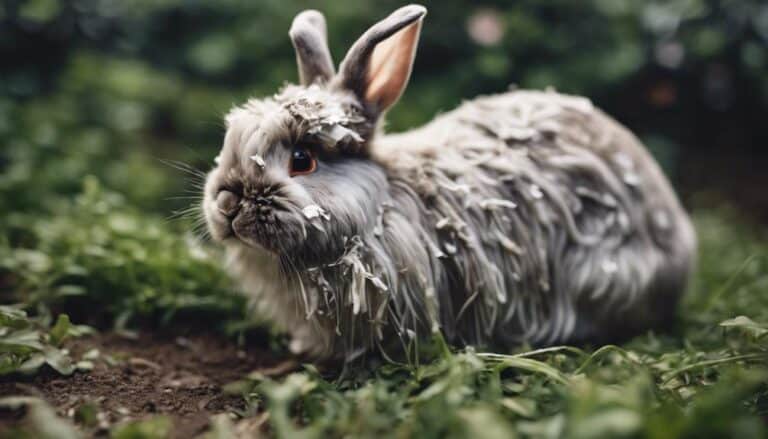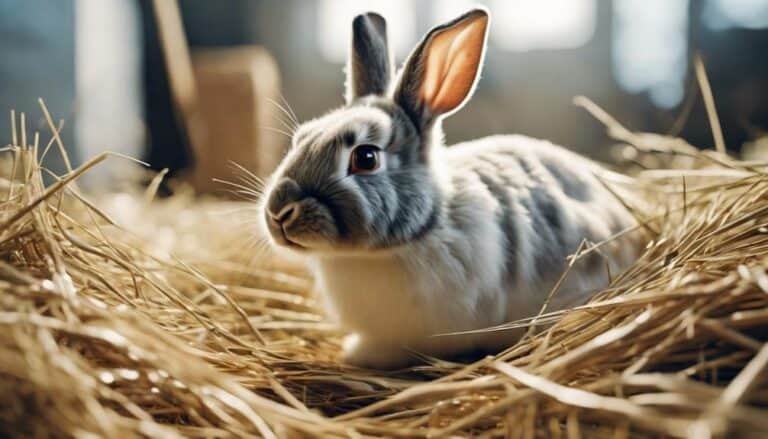Imagine a bunny's diet without hay is like a car without fuel—an essential element missing.
But have you ever wondered if hay is truly necessary for your fluffy companion's well-being?
Let's explore the significance of hay in a bunny's diet and uncover the reasons why it's more than just a dietary supplement.
Understanding the role of hay in your bunny's health might surprise you and shed light on the essential nature of this humble feed.
Contents
Key Takeaways
- Hay is essential for bunny diet due to high fiber content and digestive benefits.
- Hay supports dental health, prevents issues, and reduces the need for vet care.
- Different types of hay cater to various bunny needs, from young to sensitive teeth.
- Overall, hay is crucial for digestive health, dental care, and mimicking natural foraging behaviors in bunnies.
Importance of Hay in Bunny Diet
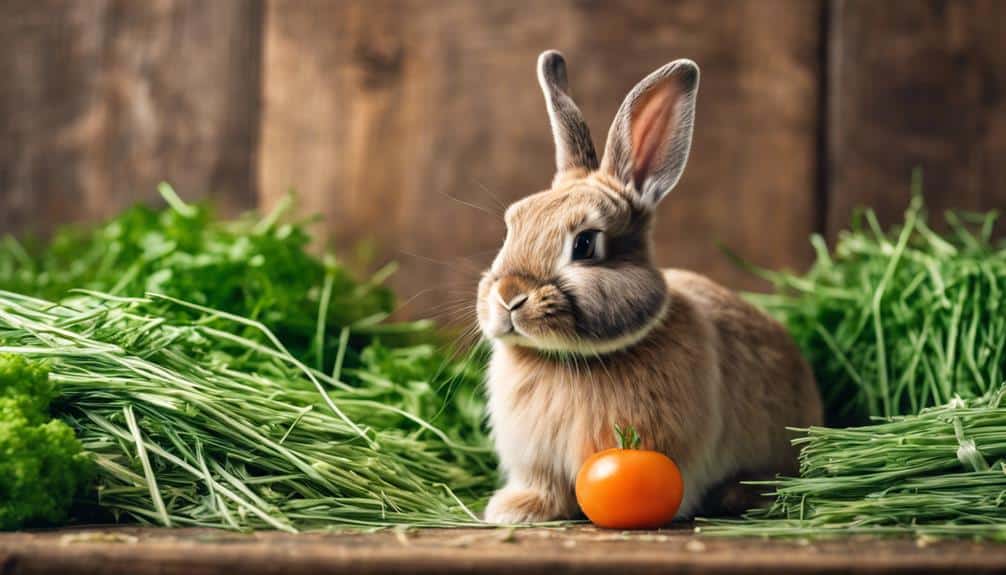
Hay plays a critical role in the diet of rabbits due to its high fiber content, essential for maintaining ideal gut health. The rough texture of hay promotes proper digestion by aiding in the movement of food through the digestive tract, preventing blockages that can be harmful to your bunny's health. Additionally, chewing hay is important for wearing down the constantly growing teeth of rabbits, helping to prevent dental issues that may arise if their teeth become too long.
Furthermore, hay supports the growth of healthy gut bacteria in rabbits, which is essential for their digestive system to function efficiently. This healthy gut flora assists in breaking down food and absorbing nutrients, ensuring your bunny receives the essential nutrients necessary for overall health and well-being. Without sufficient hay in their diet, rabbits may struggle to produce the essential fecal pellets and cecotropes needed for proper digestion and nutrient absorption.
Incorporating hay into your bunny's diet is essential for promoting the best digestive health and overall wellness.
Role of Hay in Bunny Health
Hay plays an important role in your bunny's health by promoting proper digestion and preventing gastrointestinal issues. Chewing on hay is essential for maintaining healthy teeth and avoiding dental problems in rabbits.
Hay for Digestive Health
Essential for maintaining best digestive health in bunnies, hay plays a critical role in ensuring proper gut motility and preventing serious conditions like gastrointestinal stasis. The high fiber content in hay supports the production of essential fecal pellets and cecotropes, aiding in overall digestive function.
By chewing on hay, rabbits naturally wear down their teeth, preventing dental issues such as overgrown teeth or molar spurs. Additionally, regular consumption of hay promotes the growth of healthy gut bacteria, which is essential for best digestion and nutrient absorption.
Ensuring your rabbit has a constant supply of quality hay is important for their digestive well-being, helping them avoid potentially life-threatening conditions and maintain overall health.
Hay for Dental Care
For ideal dental care in bunnies, ensuring a consistent supply of quality hay is important to prevent dental issues and maintain proper tooth alignment and function. When it comes to eating, small pet rabbits rely on hay consumption for their dental health. Here's why hay is essential for your bunny's teeth:
- Abrasive Action: The rough texture of hay helps grind down a rabbit's teeth naturally, preventing overgrowth.
- Prevention of Dental Problems: Regular chewing on hay prevents painful dental issues like spurs and misalignments.
- Cost-Effective Dental Care: Including hay in your bunny's diet supports healthy teeth, reducing the need for expensive veterinary interventions.
Hay and GI Stasis Prevention

Ensuring a sufficient intake of hay is important for preventing G.I. stasis in rabbits by maintaining regular gut movement. Hay plays a critical role in a rabbit's digestive system due to its high fiber content, which helps prevent blockages that can lead to stasis.
The fiber in hay aids in proper digestion, ensuring the healthy production of fecal pellets and cecotropes, essential for a rabbit's overall health. Without enough hay in their diet, rabbits are at a higher risk of developing G.I. stasis, a serious condition that can be fatal if not promptly addressed.
If your rabbit shows symptoms of G.I. stasis such as reduced appetite, lethargy, or a decrease in fecal output, immediate veterinary care is necessary to prevent potential fatality within as little as 24 hours.
Types of Hay for Bunnies
Regularly providing a variety of hay types is essential for meeting the dietary needs of bunnies and promoting their overall health. When selecting hay for your bunny, consider the following options:
- Timothy Hay: A staple for adult bunnies, Timothy hay provides essential fiber for proper digestion and helps wear down teeth, preventing dental issues.
- Orchard Grass: Ideal for picky eaters, this sweet-smelling hay is rich in fiber and nutrients, promoting digestive health and overall well-being.
- Oat Hay: With a softer texture than Timothy hay, oat hay is suitable for bunnies with sensitive teeth or those changing from alfalfa hay.
For young bunnies requiring a higher caloric content, alfalfa hay is recommended, while older bunnies over seven months old can benefit from changing to Timothy, orchard grass, or oat hay.
If your bunny has allergies, opt for second cutting hay, known for its softer texture and reduced risk of triggering allergic reactions compared to coarser first cutting hay. Selecting the right hay type is important for supporting your bunny's health and ensuring they enjoy a balanced diet.
Encouraging Hay Consumption in Bunnies
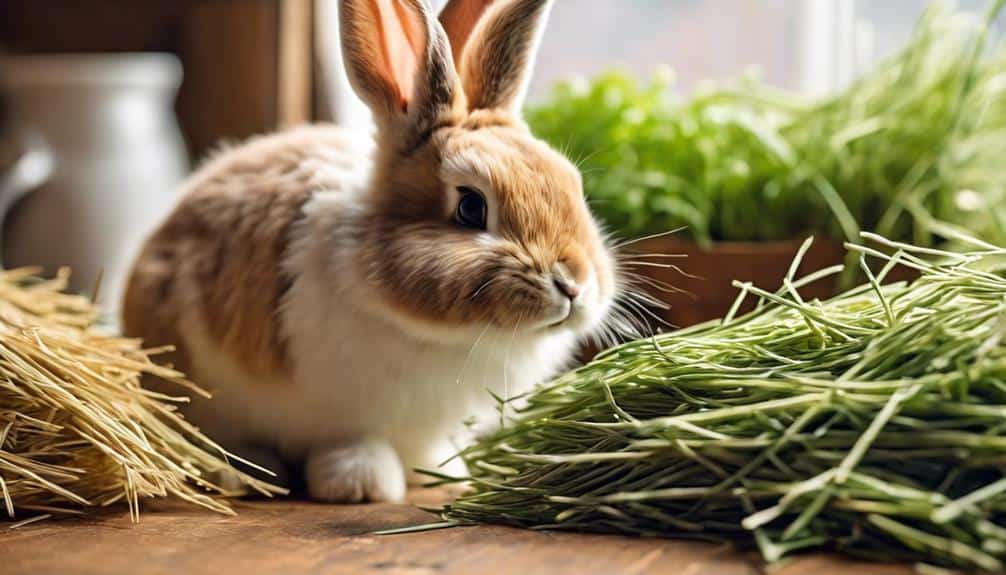
To make sure your bunny consumes enough hay for best digestion, it's important to offer a variety of hay types and mix in some tasty treats to entice them.
Placing hay in different locations and using creative tools like hay-filled toilet rolls can stimulate your bunny's natural foraging instincts.
Hay Benefits Digestion
Hay plays a pivotal role in a bunny's diet by supporting their digestive system through its rich fiber content. Here are three key ways hay benefits digestion in rabbits:
- Promotes Gut Motility: The fiber in hay aids in moving food through a bunny's digestive tract efficiently, preventing issues like gastrointestinal stasis.
- Encourages Foraging Behaviors: Offering hay mimics a bunny's natural foraging instincts, providing mental stimulation and encouraging physical activity for overall well-being.
- Aids Dental Health: Regular consumption of hay helps wear down a bunny's teeth naturally, reducing the risk of dental problems that can arise from overgrown teeth.
Hay Supports Dental Health
Encouraging consistent consumption of hay in your bunny's diet is essential for supporting their dental health and overall well-being. Chewing hay plays an important role in wearing down a rabbit's teeth, which continuously grow, preventing dental issues such as malocclusions.
Hay provides the necessary roughage and fiber needed for best dental health in rabbits. By promoting regular hay consumption, you encourage natural chewing behavior in bunnies, which is important for maintaining healthy teeth alignment. This chewing action facilitated by hay helps promote healthy tooth wear, ensuring your bunny's dental well-being.
Hence, incorporating hay into your bunny's diet isn't only beneficial for their dental health but also contributes to their overall health and happiness.
Hay Promotes Foraging Behavior
From the significance of hay for dental health in bunnies, fostering their natural foraging behavior through hay consumption is a key aspect of ensuring their mental stimulation and overall well-being.
Hay encourages bunnies to exhibit their wild instincts, keeping them mentally stimulated and engaged. When bunnies forage through hay, they showcase active behavior, mimicking their natural diet in the wild.
Providing hay in various forms and locations can entice bunnies to consume more, ensuring they're mentally and physically enriched. Hay-filled toys and tubes can also be incorporated into their environment to make hay consumption a fun and interactive experience.
Tips for Increasing Hay Intake
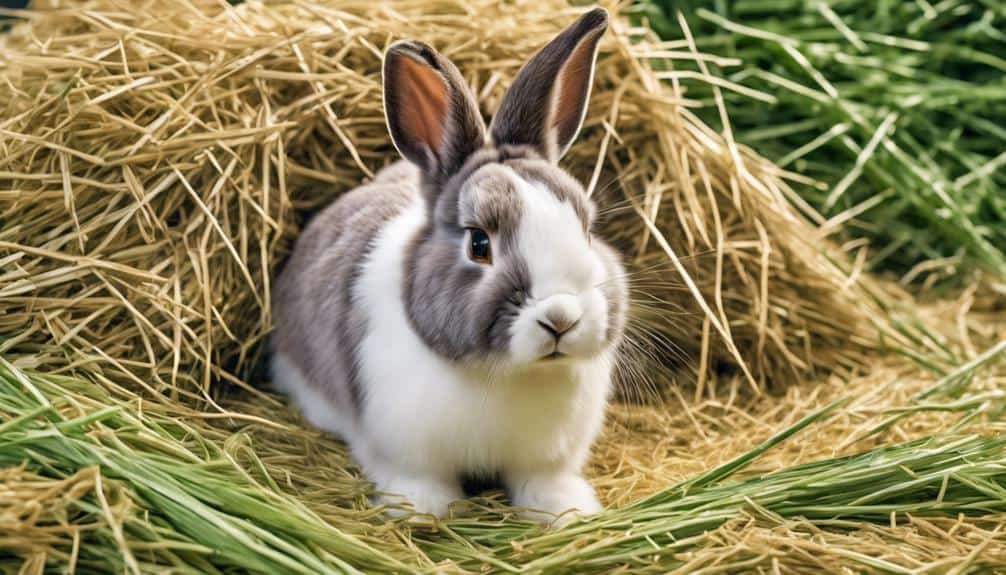
To enhance your bunny's hay intake, experiment with offering various types of hay to discover your pet's preferences. Rabbits have individual tastes, so providing options like timothy, orchard grass, or oat hay can help increase their interest in consuming hay. Mixing small amounts of tasty treats with the hay can also encourage your bunny's natural foraging behavior, making it more exciting for them to search for and nibble on the hay.
Additionally, placing hay in multiple locations throughout your bunny's living area can make it more accessible and appealing for them to munch on. Using hay-filled toys or tubes can engage your bunny in play and foraging, further promoting hay consumption.
Gradually reducing pellet intake while increasing the availability of hay can also help boost your bunny's hay intake. By offering a variety of hay types, incorporating treats, strategically placing hay, and engaging your bunny in foraging activities, you can encourage a healthier diet and digestive system for your beloved pet.
Frequently Asked Questions
Can My Rabbit Survive Without Hay?
Without hay, your rabbit may struggle to survive. Hay provides essential fiber for digestive health, aids in dental care, and guarantees proper nutrition balance. Explore hay alternatives, varieties, and storage to support your bunny's well-being.
What Percentage of a Rabbit's Diet Should Be Hay?
You absolutely need to guarantee that 80-90% of your rabbit's diet is hay for proper nutrition and digestion. Make sure to give your bunny a bundle of hay daily to keep them healthy and happy.
What if My Rabbit Is Not Eating Hay?
If your rabbit is not eating hay, try hay alternatives like fresh herbs or greens. Encourage hay consumption by offering different varieties and textures. Lack of hay can lead to digestion issues and overgrown teeth, so prioritize hay in your bunny's diet.
Is There an Alternative to Hay for Rabbits?
While hay is irreplaceable for a bunny's health, exploring hay substitutes like high-fiber pellets, fresh herbs, and foraging opportunities can boost nutrition. However, hay-free diets risk critical fiber deficiency, impacting digestion and dental health.
Why is Hay Important for a Bunny’s Diet?
Hay is essential for bunny health for several reasons. Firstly, it helps with digestion by providing necessary fiber. Secondly, it keeps their teeth healthy and worn down. Finally, it encourages foraging behavior, which is important for their mental stimulation. Overall, hay is crucial for a well-balanced bunny diet.
Conclusion
As you reflect on the pivotal role of hay in your bunny's diet, you may find yourself drawn to the simplicity yet significance of this humble food.
Just as hay provides sustenance and well-being to your furry companion, perhaps it also serves as a reminder of the interconnectedness of all living beings.
Embrace the power of hay in nurturing your bunny's health, and in turn, fostering a deeper connection with the natural world around you.


